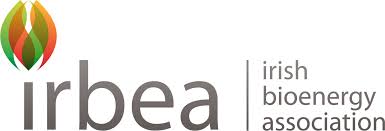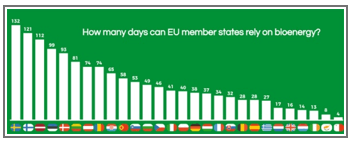 Bioenergy is Europe’s leading renewable energy source. According to Eurostat data and calculations by the European Biomass Association (AEBIOM), bioenergy will account for 11% of the final energy consumption in the EU-28 this year. Other renewable energy sources, like hydropower, wind, solar and geothermal, stand for another 7%. But still, non-renewable energy makes up 82% of the EU’s energy use.
Bioenergy is Europe’s leading renewable energy source. According to Eurostat data and calculations by the European Biomass Association (AEBIOM), bioenergy will account for 11% of the final energy consumption in the EU-28 this year. Other renewable energy sources, like hydropower, wind, solar and geothermal, stand for another 7%. But still, non-renewable energy makes up 82% of the EU’s energy use.
For the EU as a whole, this means that all energy use from 21st November until the end of the year will come from bioenergy, and therefore AEBIOM has already celebrated the European Bioenergy Day on 21st November.
2017 has been pivotal for the future of bioenergy across Europe and Ireland. Bioenergy in particular is expected to provide Ireland with 13 days of energy. As the EU discusses its new renewable energy objectives – including policies with significant impact on our country – The Irish Bioenergy Association (IrBEA) has joined a group of 20 other associations in the launch of a new information campaign to remind the leading role played by bioenergy in the energy transition. Other EU member states with high shares of bioenergy are Finland (33%), Latvia (31%), Estonia (27%), Denmark (25%), Lithuania (22%), and Austria and Romania (both 20%). Sweden is showing the way by using bioenergy in all sectors of society, in heating, power production, industry and for transport. 20% of all transport fuels are already biofuels in Sweden. A major reason behind the Swedish success story on bioenergy is the Swedish carbon taxation and broad political support. With strong general incentives, the market actors have implemented smart and cost-efficient technologies to use biomass for energy. Despite the large use of bioenergy from forests, the standing volume of the Swedish forests has almost doubled in the last century.
 Public support for renewables is at a reasonable high across Ireland with the recent announcement of the Support Scheme for Renewable Heat (SSRH) and with the Renewable Electricity Support Scheme (RESS) going through the final consultation phase with DCCAE – yet most of us find difficult to weigh the contribution of bioenergy in the energy transition. In order to grasp the importance of this often-neglected source of renewable energy, IrBEA has joined the Bioenergy Day campaign, recently launched by a group of national and international associations led by AEBIOM (European Biomass Association). Its aim is to offer a clearer understanding of where both the EU and individual Member States stand in the development of bioenergy.
Public support for renewables is at a reasonable high across Ireland with the recent announcement of the Support Scheme for Renewable Heat (SSRH) and with the Renewable Electricity Support Scheme (RESS) going through the final consultation phase with DCCAE – yet most of us find difficult to weigh the contribution of bioenergy in the energy transition. In order to grasp the importance of this often-neglected source of renewable energy, IrBEA has joined the Bioenergy Day campaign, recently launched by a group of national and international associations led by AEBIOM (European Biomass Association). Its aim is to offer a clearer understanding of where both the EU and individual Member States stand in the development of bioenergy.
As far as Ireland is concerned, moving beyond 2020 and EU targets, 2030 commitments have been already made under the revised EU RES directive. This is useful to support the development of national legislation, but we should not need to be continually nudged along by EU targets and the threat of sanctions. This is not the best approach to policy-making. In a post-Brexit world – there is a need for a national vision, embraced by our citizens and our public representatives. Things should be done because of the threats posed by climate change, rather than undertaking them because we signed up to an EU target.
The 18TH December is the symbolic date that IrBEA has chosen to celebrate Ireland’s Bioenergy Day, the day from which Ireland could be fuelled by bioenergy alone until the end of the year.
Considering that Bioenergy Day falls on the December 18th (just 13 days on bioenergy), Ireland needs to speed up its deployment of bioenergy throughout the country by a full implementation within the national energy strategy, in order to demonstrate a commitment matching that of the European Union.
‘Looking to the future, more needs to be done to bolster bioenergy in Ireland, which has considerable potential to help drive the energy transition. IrBEA is leading this energy transition through the government and at European Commission level to contribute to policy development and regulatory details to develop sustainable bioenergy markets. The recent announcement of the Support Scheme for Renewable heat (SSRH) is a very welcome development for the bioenergy sector in Ireland, one that has been stagnant for almost 5 years since 2013 whereby many Irish companies have subsequently gone out of business and perhaps why we can only rely on bioenergy for 13 days. There will be new opportunities now to stimulate growth for those businesses in the biomass supply side and indeed the biomass technology provider of which we have many as members of the Irish Bioenergy Association.’ says Ger Devlin, IrBEA CEO.
According to IrBEA, Ireland’s bioenergy sector should aspire to move the date to October by 2030, leveraging on an untapped, sustainable stock of biomass materials. Being currently produced from a great diversity of raw materials such as wood pellets and chips, straw, vegetable oil, manure, agro-industrial and organic waste, bioenergy has plenty of ways to reach that target – including unconventional materials and innovative technologies.
Contact us:
Visit the campaign’s website: www.europeanbioenergyday.eu
For more information please visit www.irbea.org and www.bioenergyfutureireland.com or contact
Dr Ger Devlin – IrBEA CEO ger.devlin@irbea.org
contact@irbea.org
Follow us on Twitter @IrishBioenergy and @BioenergyI
About the Irish Bioenergy Association
Dr Ger Devlin is CEO of the Irish Bioenergy Association. With over 200 members, IrBEA is the national association representing the bioenergy industry on the island of Ireland. The main objectives of the association are to influence policy makers, to promote the development of bioenergy and to promote the interests of its members. Improving public awareness, networking and information sharing and liaising with similar interest groups are other key areas of work in promoting biomass as an environmental, economic and socially-sustainable energy resource. www.irbea.org and www.bioenergyfutureireland.com
